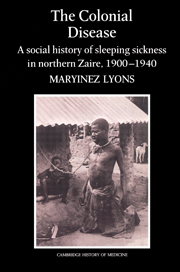Book contents
- Frontmatter
- Contents
- List of maps
- List of plates
- List of tables
- Preface
- List of abbreviations
- Map 1 Africa: political
- 1 Disease and medicine in the history of Africa
- 2 From private empire to public colony
- 3 Mise en valeur: economic exploitation
- 4 Epidemiology and ecology of human sleeping sickness
- 5 ‘The Lure of the Exotic’: sleeping sickness, tropical medicine and imperialism
- 6 Discovery: Liverpool scientists in the Congo
- 7 The campaign. Part one: sleeping sickness and social medicine
- 8 The campaign. Part two: the surveys and tensions
- 9 The African response
- 10 Public health, social engineering and African lives
- 11 Conclusion and legacy
- Appendices
- Notes
- Select bibliography
- Index
11 - Conclusion and legacy
Published online by Cambridge University Press: 06 January 2010
- Frontmatter
- Contents
- List of maps
- List of plates
- List of tables
- Preface
- List of abbreviations
- Map 1 Africa: political
- 1 Disease and medicine in the history of Africa
- 2 From private empire to public colony
- 3 Mise en valeur: economic exploitation
- 4 Epidemiology and ecology of human sleeping sickness
- 5 ‘The Lure of the Exotic’: sleeping sickness, tropical medicine and imperialism
- 6 Discovery: Liverpool scientists in the Congo
- 7 The campaign. Part one: sleeping sickness and social medicine
- 8 The campaign. Part two: the surveys and tensions
- 9 The African response
- 10 Public health, social engineering and African lives
- 11 Conclusion and legacy
- Appendices
- Notes
- Select bibliography
- Index
Summary
Belgian pride in medical services – best in Africa
When their colonial venture came to an abrupt end in June 1960, the Belgians were convinced of the success of at least one aspect of their halfcentury administering the Congo – they were confident that their medical service was outstanding in all of colonial Africa. Many agreed. In 1958 a European Common Market survey described the medical infrastructure in the Belgian Congo as the best in tropical Africa and a 1959 US government report agreed that the Belgian programme was one of the best on the continent with more hospital beds in the Congo than in all the rest of tropical Africa. Most Belgian administrators would have explained that their paternalistic administration had been a resounding success in the area of public health; this success, they would argue was exemplified in part by the near-conquest by medical means of at least one disease, human sleeping sickness.
Sleeping sickness and ‘vertical’ health programme
They believed that their policy of concentrating efforts and resources in a campaign aimed at one disease, sleeping sickness, was responsible in large part for this success. In public health parlance, such concentration of resources is described as a Vertical' model of health-care delivery. As we have seen, their approach to control of the disease, unlike that of the British for instance, had been the attempted medication of the entire population of the colony in order to systematically ‘sterilise’ the human reservoir of the disease-causing parasites, the trypanosomes. The campaigns of mass chemotherapy were aimed at the parasite while the basic ecology of the disease remained unaltered.
- Type
- Chapter
- Information
- The Colonial DiseaseA Social History of Sleeping Sickness in Northern Zaire, 1900–1940, pp. 223 - 233Publisher: Cambridge University PressPrint publication year: 1992



